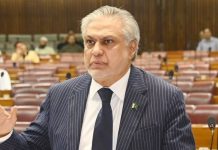Foreign Desk Report
BEIJING: Russian Foreign Minister Sergei Lavrov began a visit to China on Monday with a call for Moscow and Beijing to reduce their dependence on the U.S. dollar and Western payment systems to push back against what he called the West’s ideological agenda. U.S. and Chinese officials on Friday concluded what Washington called “tough and direct” talks in Alaska, while Russia’s ambassador arrived back in Moscow on Sunday for consultations after Biden said he believed President Vladimir Putin was a killer.
Russia is also braced for a new round of U.S. sanctions over what Washington says was its meddling in the 2020 U.S. presidential election, which Moscow denies. Speaking to Chinese media before the start of his visit, Lavrov said Moscow and Beijing were compelled to develop independently of Washington in order to thwart what he said were U.S. attempts to curb their technological development. “We need to reduce sanctions risks by bolstering our technological independence, by switching to payments in our national currencies and global currencies that serve as an alternative to the dollar,” Lavrov said, according to a transcript of his interview released on Monday.
“We need to move away from using international payment systems controlled by the West.” Chinese State Councilor and Foreign Minister Wang Yi met Lavrov in Guilin, South China’s Guangxi Zhuang Autonomous Region, a popular tourist site, on Monday. The atmosphere of the meeting was different from the intense China-US Anchorage meeting. Lavrov enjoyed a boat ride on Lijiang River, a beautiful scenic spot, before he arrived at the venue for his meeting with Wang.
Later in the day, the two foreign ministers also discussed the Iranian nuclear deal, Afghan peace process, Myanmar situation, Syria, climate change and UN reform, according to a statement from the Chinese Foreign Ministry. Wang also greeted Lavrov with an elbow bump, which replaced a handshake amid the COVID-19 pandemic, but the elbow greetings didn’t happen between Chinese and US chief diplomats in Anchorage. Some Chinese netizens guess that choosing Guilin to receive Lavrov and the Russian delegation is because “Guilin” in Chinese is homophonic to the meaning of “honorable neighbor.”
The development of China-Russia ties does not target any particular country, and the bilateral relationship is open and aboveboard, unlike the cliques with hidden conspiracies seen in a few other countries, a Chinese Foreign Ministry spokesperson said. Spokesperson Hua Chunying made the remarks at a daily press briefing in response to a question on whether Lavrov’s visit to China is an intentional arrangement made after the China-US high-level strategic dialogue in Alaska. Chinese analysts said China and Russia will exchange their opinions and stances, as well as concerns on many international issues, and will cooperate on diplomacy, politics and security, and China’s recent dialogue with the US is one of the topics that both sides share interests.




